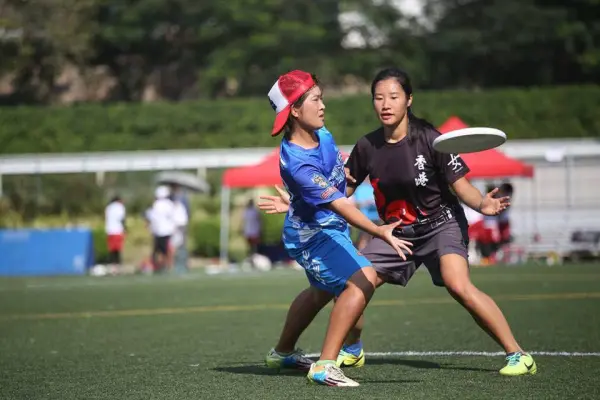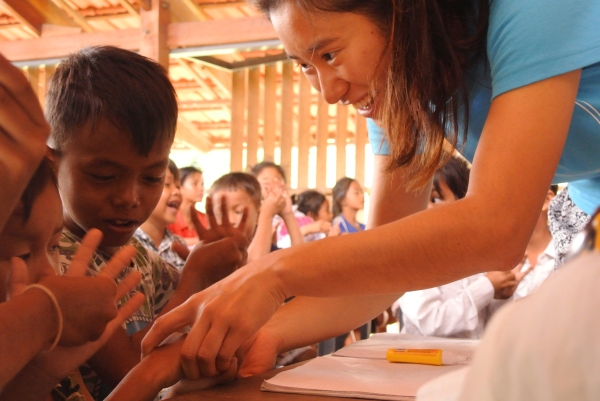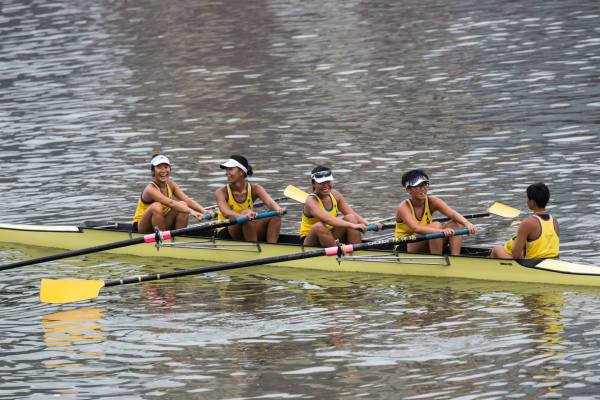Florence Pang — varsity team rower, ultimate frisbee player and 4th year med. student — sharing her perspectives on how sports is complementary to her busy life in medical school

Going into her 4th year of medical studies at the Chinese University of Hong Kong (CUHK), Florence (Flo) is still actively involved in sports. She has represented Hong Kong in Ultimate Frisbee and captained the CUHK Rowing Team. Flo joined the Hong Kong Ultimate Players Association 3 years ago and at the same time, she started rowing in her first year at CUHK. She is currently rowing for the university rowing team and training 6 days a week in early mornings; as well as sometimes training the girls on her team how to row. She also attends trainings for a mixed-gender Ultimate Frisbee team, Double T, and the Hong Kong Under-24 training team 2-3 times a week. As the captain and active rower of the university rowing team, Flo wants to help develop the team of novice rowers to appreciate the beauty of the sport and have fun in spite of the rigorous trainings. When she is not studying and training, Flo enjoys reading, singing and spending time with family and friends.
You’re a 4th year medical student now so you must be very busy with school. But you also love to sing and you do volunteer work. How do you manage to fit it all into your schedule?
I personally cannot memorize large amounts of information in a short period of time. I try to space out my study schedule by starting earlier on in the school year. Reading  notes after lectures everyday consolidates my understanding and helps me remember faster when I study for exams. I usually focus on academics in the school term and participate in other activities after exams to avoid having too many things on my plate. I do most of my volunteering work with a non-profit organization called Project Little Dream (PLD). We do preparation and liaison work throughout the year and visit our on-going projects in Cambodia during the semester breaks (in June and December). As for singing, it is easy! I’m the weird girl who hums when walking on the streets pretending to be in a musical. My shower is also a karaoke room incognito, only revealing its true identity when I am using it.
notes after lectures everyday consolidates my understanding and helps me remember faster when I study for exams. I usually focus on academics in the school term and participate in other activities after exams to avoid having too many things on my plate. I do most of my volunteering work with a non-profit organization called Project Little Dream (PLD). We do preparation and liaison work throughout the year and visit our on-going projects in Cambodia during the semester breaks (in June and December). As for singing, it is easy! I’m the weird girl who hums when walking on the streets pretending to be in a musical. My shower is also a karaoke room incognito, only revealing its true identity when I am using it.
You went to an all-girls boarding school in Canada. What was it like doing sports there? Are you able to compare doing sports there and coming back to HK and doing sports at university here, where sports is co-ed (even if you have men’s and women’s teams)?
My high school had a very encouraging environment for students to do sport. Our teachers focused on participation and individual development, rather than on winning. It allowed students to learn new sports without asserting any pressure. Sports at the varsity level is surely a lot more competitive than in high school. The athletes I met at university are more passionate about their sport and their team. Using rowers as an example, we train 4-5 hours each day, trying to raise our intensity through learning from our men’s rowing team and other university rowing crews. Varsity rowing is tough, but the amount of time we spend and the challenges we face together strengthen our companionship, which is something that I did not experience as strongly in high school.
What do participating at sports at a varsity level bring to your academic studies and even personal / social life at school? Why do sports matter to you as an university student?
Varsity rowing has trained me into a more disciplined and determined person.  A large part of training is set to push and exceed our limits. The mental toughness I have developed from rowing has helped me manage the stress from medical school and strive through with a clear and calm mind. Doing sports at university has also allowed me to meet people of diverse backgrounds from various disciplines. It is refreshing to have friends with distinctive and equally extraordinary goals in life while still sharing the same love towards sports.
A large part of training is set to push and exceed our limits. The mental toughness I have developed from rowing has helped me manage the stress from medical school and strive through with a clear and calm mind. Doing sports at university has also allowed me to meet people of diverse backgrounds from various disciplines. It is refreshing to have friends with distinctive and equally extraordinary goals in life while still sharing the same love towards sports.
When you’re faced with heavy academic and exam pressure, do you feel external pressure (e.g. from friends, family, teachers) to reduce the amount of sports you play? Do you personally feel the need or the urge to reduce your sporting endeavours? If there’s a conflict, how do you balance the external and internal pressures?

Pressure for me stems from self-expectations and doubts, both of which can beinfluenced by external factors. I become anxious when I feel like I am falling behind compared to my friends; I feel guilty when my family jokes about how I only do sports. I usually start to cut down (but not quit completely) my trainings two months prior to my exams to make time for studying. However, as I am approaching my clinical years of medical school, reducing the amount of time I spent on sports is inevitable. Yet, I am still hopeful that I can maintain my academics while still being able to mess around with a frisbee or going for a morning row once in a while.
It’s been said of course that when faced with academic and exam pressures that it’s healthy to do some sports or be a bit active, even if just for short periods of time each day. Yet, oftentimes parents and sometimes students themselves don’t feel that way. What would you say in response to this and what words of advice would you offer to those parents and students?
When I was 13, I entered a new school with high achieving peers who excelled in every way possible. I struggled and cried almost every week, wishing that I was brighter and that I could learn faster. I gave up on many things that I love, to be a fraction of how studious my classmates were.
It wasn’t until later on in high school did I recognize the tremendous stress I forced upon myself and the unhealthy amount of time I wasted on doubting my abilities. I picked up old hobbies that I almost forgot I once had. I began enjoying learning a lot more than before. I became happier.
Going back into sports pulled me out of the dark pit that I was sinking in. I stopped putting down myself, the fear that was bottled in me vacated and I learned to face failures with poise while rejections with grace.
As the Chinese expression goes, “Taking a breather is important for accomplishing a longer journey ahead (休息是為了走更長的路).” School and hobbies complement each other. They keep the mind sharp and emotions in check. I definitely agree that doing sports or some other hobbies in between studying is healthier for the mind and body.
Do you face any gender stereotyping as a female rower? If so, what are these stereotypes that you face, and what are the misconceptions about them?
People often are curious as to what I do instead of stereotyping. A question that I got before was whether I bulk for rowing. Muscle mass is definitely important but in my opinion bulking is not necessary. I go to the gym regularly and have a normal diet to stay strong. However, I have heard comments like “rowing girls are not girls.” Maybe because of our tanned skin, the casual looks after training or just generally being the tenacious group; but at the end of the day, rowing girls are like any other group of girls. We face and fight against our insecurities everyday. And I will take that statement as a form of compliment, because we are a group of girls who treat sports as seriously and work as hard as the guys to reach our goals.
Sometimes the idea of being part of a varsity sports team can scare away girls who don’t feel they’re athletic enough or who have never really take sports seriously. What do you think about this, and how would you encourage some of our students to try anyway?
Doing sports has always been my hobby. I didn’t really take it seriously until university when I signed up for the rowing team and joined the Ultimate Frisbee community in Hong Kong. Of course, having a sports background will help in picking up a new sport and to become good at it quickly, but there is no harm in trying otherwise. I always tell myself that the body can achieve what the mind believes. If your mind is set on something, even at a disadvantage, you will find your way and be at the level you want to be, in sports or just about anything in life. So give it a go. After all, why not?
